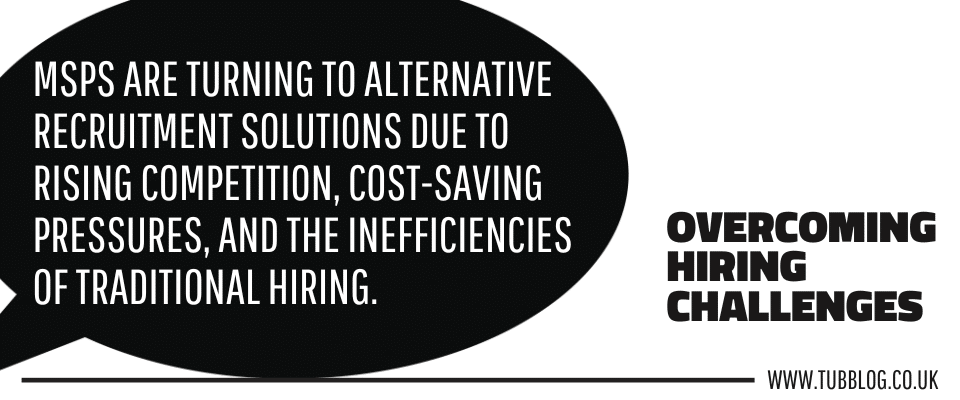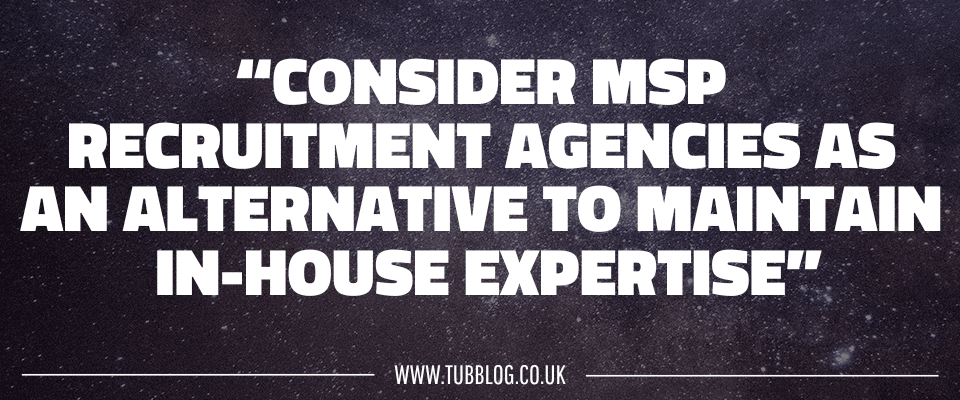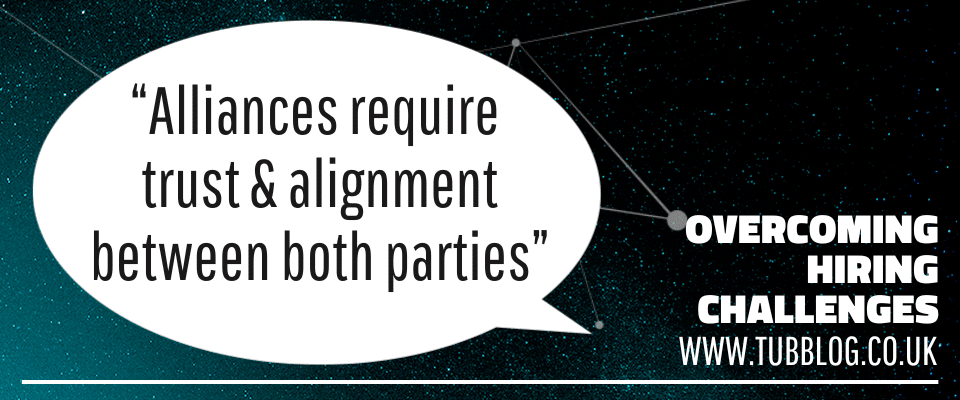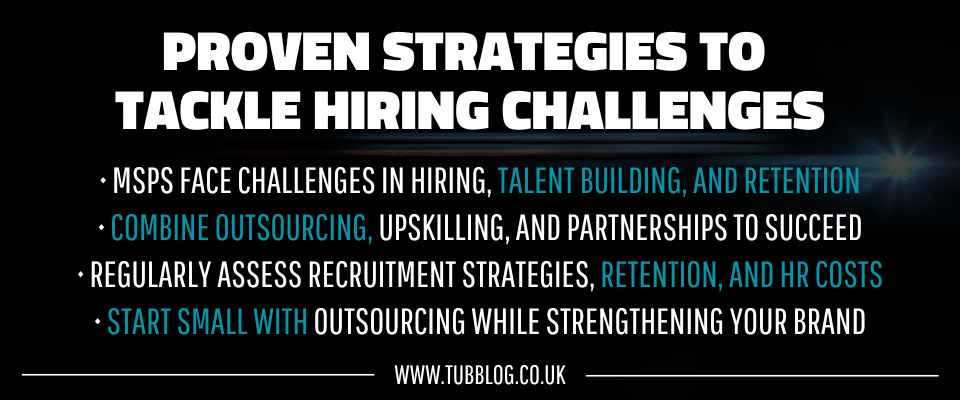We’re living in an exciting time for growing and developing a Managed Service Provider (MSP) business. But what about MSP recruitment?
The shackles of traditional one-team, one-focus MSP recruitment seem to be pulling away, with many MSPs and IT business owners instead deciding to look at more flexible, sustainable workforce planning.
But what’s driving this? Across all aspects of MSP operations, there seems to be a significant change in gear towards a more efficient way of hiring, training, and managing personnel.
In fact, you may well have read a few of our articles and listened to Richard talk about MSP recruitment trends and challenges.
In this article, I’ll be looking at what’s driving MSPs away from traditional hiring routes, and considering popular ‘new’ options such as:
- Outsourcing
- AI and automation
- Strategic alliances
- Upskilling
So, without further ado, let’s address the elephant in the room – the recruitment shortage.
Are Business Owners Really Facing an MSP Recruitment Shortage?
Given that MSPs wear lots of different hats and provide many different services to their clients, it’s reasonable to expect some recruitment fluctuation. After all, the world has seen one of the most tumultuous half-decades in recent history – for reasons I’ll cover shortly.
Several experts in the MSP space believe that finding and hiring the right people has become more and more complex, at least through traditional routes. Islam Soliman for IT Europa refers to MSP representatives growing concerned that there are lots of people who are certified, but not enough people who are experienced in specific areas.
It’s not that there’s a shortage of people to hire for MSPs – it’s that it’s getting harder to find the right talent. For example, an MSP could traditionally head-hunt a qualified networking engineer, take them to interview, and find they have zero real-world experience. That’s an exceptional amount of time and money wasted.
Therefore, it’s no wonder that MSPs are growing frustrated with traditional recruitment and are instead thinking about more flexible options.
There are a few more reasons, beyond increasing skills gaps, why traditional hiring just isn’t cutting it for MSPs in 2024.
These include:
- The tools that engineers and specialists need for roles within MSPs are always evolving, and in some cases, are becoming more complex. That means the selection of specialists with skills in these tools is potentially shrinking.
- At the same time, many tools that specialists have trained themselves in are becoming obsolete thanks to the rise of automation and AI (artificial intelligence). Therefore, talented people who might previously have been adept hires now need to completely retrain and repivot.
- We also need to consider the COVID-19 remote working revolution. Many specialists now hold several cards when it comes to location preferences. Some may only want to work from home, when some MSPs only have the facility to employ people in-house.
- In line with cost of living challenges and inflation over the past few years, employees and job applicants have (quite reasonably in many cases) increased their salary expectations. Some MSPs simply can’t afford to meet these demands, and have looked into alternative, cheaper hiring methods. More on those below.
- Finally, many vacancies are simply going unfilled. This is happening worldwide, and across many different industries. Reasons for this include employee disenchantment during the pandemic, salary concerns, and, again, skills gaps.
Altogether, we’re looking at a series of worrying challenges that have built up into a messy recruitment headaches for traditional MSPs. And yet, these aren’t the only reasons why business operators are leaning away from old-school hiring and training practices.
What Else Might be Pushing People into Alternative MSP Recruitment Solutions?
For one, it’s all about the bottom line. Around three in ten companies outsource their IT operations to save money (more on outsourcing as a viable recruitment option later). That’s referring to business owners leaning into MSPs, in the main – but we can apply the same argument to how MSPs are hiring their own experts, too.
Everyone’s out to save money as well as make it – and in a fluctuating global economy, one can hardly blame MSPs for wanting to trim away financial fat and any time wasted hunting down bad hires.
Speaking of hiring, let’s focus on those headaches. MSPs are facing an unprecedented level of competition as we approach the middle of the decade. In fact, around 30% of MSP owners cite rising competition as their main challenge.
Given that competition is fierce and that the space is growing smaller, MSPs are under greater pressure than ever before to hire the right people as soon as possible. As we can see, relying on the same tired recruitment processes is likely keeping these firms back from growing and making progress.
And yet, there’s more!
Bad hires are just one concern for MSPs during recruitment. There’s also the matter of time-to-hire. With competition building and technology advancing rapidly, firms need to onboard talented people quicker than ever before – but that also means doing so without accidentally hiring the wrong people!
The average time to hire across industries right now is around 44 days. That’s per person – and that number is increasing year-on-year.
On average, MSPs can expect to interview around six people for every role they hire for. Keep in mind, that’s a global average – and while it might not seem like a huge number, it’s still a lot of administration and decision-making. And, that’s six people whittled down after weeks of decision-making.
This all paints a pretty clear picture of why MSPs are growing disenchanted with traditional recruitment funnels. Is it any wonder, therefore, why business owners are leaping into alternative, more sustainable ways to recruit reliable people to help run MSPs?
With that in mind, let’s look to the future…
What Alternative Options are Opening up in MSP Recruitment?
In the introduction, I briefly mentioned the more appealing options beyond traditional recruitment methods that are opening up to MSPs right now – but, to refresh your memory, and to give you a little more context, here are the most popular alternative routes:
- Outsourcing: Where MSPs hire experts for specific projects and for specific set hours off-site
- AI and automation: Where MSPs are both cutting down on hiring admin and reducing the need for human resources in menial roles
- Building strategic alliances: Where MSPs are working with specific, successful firms and experts to mutually support each other
- Investing in skill development: Where MSPs choose to invest in their people, rather than to simply hire new experts every time a skills gap emerges
Let’s explore each of these options in a little more detail.
Outsourcing
Many businesses outsource to MSPs, but there are plenty of benefits in MSPs outsourcing their own work to certain firms and experts, too!
In fact, many business owners grow their client bases by harnessing support from other experts. It can be a lucrative way to efficiently build up a company to either grow more competitive or to sell on at a later date.
Outsourcing is, of course, all about delegating work out of house. It’s a particularly useful way to grow client relationships without having to manage an in-house team or continue hiring personnel for every open role.
Some companies, for example, outsource to MSPs for cybersecurity expertise – and at the same time, those MSPs might white-label these services, meaning they outsource it to another third party, with everyone in the chain understanding what’s taking place.
The Benefits of Outsourcing
There are some immediate benefits to outsourcing as an MSP. To start, MSPs can save money on paying wages and benefits for employees who work a default number of hours each week. By setting up an outsourcing contract with a specialist, an MSP only ever needs to pay for the hours or project work they need, effectively keeping costs low.
Beyond this, outsourcing to a specialist means MSPs are working with experts from the get-go. As I explained in my post regarding outsourcing cybersecurity for MSPs, you cut out the concern about skills gaps and hiring people who fail to live up to expectations. There’s no training period and very little risk when it comes to expertise.
In the same article, I also mentioned that outsourcing work as an MSP also helps to support scalability. Instead of spending time, money, and planning effort hiring for multiple different departments – while you’re actually trying to run a business – you can simply delegate and let tasks take care of themselves.
Consider Outsourcing to a VA
One of the most effective ways of growing a business through the power of outsourcing is to work with virtual assistants. Instead of handling tasks such as communications, marketing, and sales in-house, many MSP leaders choose to delegate daily running tasks to professionals who work off-grid.
Virtual assistants are fantastic examples of self-starting experts who need less management and oversight compared to in-house employees. Typically, you can provide VAs with regular tasks and touch base to ensure targets are met, and otherwise provide them with complete autonomy once you’ve established a clear working relationship. Our guide goes into more detail as to why working with virtual assistants is so beneficial in the modern age.
While I’ve painted a fairly positive picture of outsourcing as a viable alternative to traditional recruitment, it’s important to keep things in balance. For one thing, you’re still going to need to hire your own experts to help you maintain strength in what you do well.
Things to Consider if Outsourcing is Your MSP Recruitment Solution
As MSP expert Mark Matthews discussed with Richard via TubbTalk, it’s wise to specialise in specific areas – you don’t want to be a jack of all trades and a master of none. Mark advised that, on route to outsourcing, you should consider:
- How much time and money you will need to train staff in a specialism
- The resources needed to build an in-house team
- Whether or not it’s worth building a team just to have to start all over again
I’d seriously recommend listening to Mark’s talk with Richard – as he runs through more tips on how to prepare for working with an outsourcer for the first time.
When it comes to finding an outsourcing partner, you’re spoiled for choice. There are some fantastic, reputable, and well-established companies out there you can delegate to – such as Uptime, a white label IT support company that offers specific solutions for MSPs (and which comes with a personal recommendation from Richard).
If you’re keen to grow your client base but don’t have much time to handle general enquiries, for example, you might also consider working with AnswerConnect. For more food for thought, Richard tapped into the benefits of helpdesk outsourcing for MSPs with Uptime Bradley Munday and Jason Kemsley.
And then, for cybersecurity, there’s always Barracuda MSP – who provide education and security support on demand.
From there, if you need support with professional services in areas such as AI and infrastructure, you can rely on teams such as Pax8 – Richard spoke to the firm’s Principal Consultant, Andy Readman, to get the lowdown on what their services entail.
Is outsourcing the best option?
Not necessarily – outsourcing presents a few challenges, such as the fact you won’t have access to an exclusive, in-house team. If you’d prefer to keep your operations close-knit and behind closed doors, it might not be viable for you.
That’s why it’s always worth considering MSP recruitment agencies. Former MSP owner Daniel Welling, for example, set up Welling MSP as a specialist recruitment company to help firms find talent efficiently and cost-effectively.
Daniel, in conversation with Richard, explores some of the bigger roadblocks preventing MSPs from approaching recruitment agencies – and cost is a big factor. Welling MSP’s model effectively matches a company’s cash flow and provides personnel based on its measured risk profile.
The MSP recruitment industry is larger than perhaps many business owners realise. Dean Watmough, for example, set up Humnize to specifically help MSPs build and develop teams from scratch. In fact, he tries to avoid the word ‘recruitment’ wherever possible – simply because of the negative connotations it can bring!
Therefore, before leaping into outsourcing wholesale, it’s certainly worth considering a specialist recruitment option, or at least looking into the remaining options I’ve yet to talk about!
AI and automation
It’s pretty safe to say that AI and automation have altered the way many jobs are performed in just a few short years, and the same could even be said for industries! MSPs are, naturally, always looking for ways to provide fantastic services more efficiently – both to keep their clients happy and to keep ahead of the competition.
Automation and AI can help MSPs with recruitment challenges in two key ways:
- MSPs can delegate certain tasks to machines and automation
- MSPs can use AI and automation to improve and speed up hiring processes
Some companies even follow both methods! Many menial tasks are easily automated using a variety of specialist software – and AI can even be used to help support threat detection and bolster communication between separate devices.
Essentially, if there is an opportunity for human effort to be reduced, you can be sure that AI and automation can step in and help. That said, neither are likely to ‘take’ human jobs or roles in the years to come – if anything, people will need to learn how to complement their working strategies with the software.
Certain hiring software and recruitment dashboards can organise funnels so that applicants are kept informed at each step of the process. What’s more, MSPs can automate certain areas of hiring, such as by setting up chatbots to answer simple questions and to deliver information as and when required.
It’s not wise to rely on AI wholesale to manage certain tasks and even to help cut down workloads. As Gudrun explains in her article on supporting MSP clients with AI tools, there are always going to be cybersecurity risks when rolling out AI for clients, and when using AI to generate content, there’s always a risk of accidental plagiarism. Tread carefully!
Building strategic alliances
Building strategic alliances is all about sharing expertise and talent – it’s mutual support between two experts, and it doesn’t have to be transactional.
For example, an MSP specialising in one area of IT support for its clients could ‘top up’ its knowledge and expertise by working directly with another firm that’s a known expert, and who is willing to work on an exchange of ideas and physical support.
This can work well provided that companies involved build up a culture of trust, and that both businesses align with each others’ goals and needs. Therefore, setting up a strategic alliance can be a delicate process that doesn’t always lead to the perfect partnership.
What’s more, this recruitment alternative doesn’t necessarily solve the wider hiring problems MSPs face. It’s often seen as safer and more scalable for MSPs to outsource specific tasks and roles to specialists as and when they find them or need them, in line with client needs. Richard himself was successful with outsourcing to peers.
So, strategic alliances do work – it just takes some careful relationship nurturing, and of course, necessary paperwork along the way!
Investing in skill development
For many MSPs, making the most of talent they already have is likely to be the most cost-effective and efficient way to build a team of specialists. After all, provided they have hired people who are receptive to upskilling and growing with a specific firm, there are no reasons why they can’t build upon their skill sets and learn new things along the way.
However, there needs to be a careful balance in terms of budget and effort. Will it take more time, money, and hassle to set up training than it will to, say, hire people outright?
To fine-tune an upskilling strategy, MSPs need to be laser-focused on what they want from their hires. They should ideally test skills and personalities before hiring, for example, so they can be assured they’re recruiting people who are fully receptive and aligned with their culture and values.
Otherwise, upskilling people could lead to failed experiments – and if you give people too many hats, it’s easy to get overwhelmed and feel burned out. Surely it would be better to fine-tune one or two areas of expertise!
If you want to build a strong MSP with an upskilled backbone, there are a few steps you can take to position yourself as an appealing authority to the right type of people. Stephen wrote in his guide to hiring the best technical staff for your business.
Here’s a quick summary:
- Build your brand: Create and nurture a brand that clearly invests in people and which offers technical opportunities. Make your brand more than just recognisable, but also desirable – show that you’re accountable for your actions and that you support trust and openness.
- Offer incentives and training: Many people just want to learn and explore what they can do with their talents. No one truly intends to apply for jobs in dead-end roles, meaning you should make it clear that you invest in cutting-edge technology and supply useful training opportunities for those who are growing their careers.
- Look for the right attitude: As mentioned above, it’s just as important to look for personality as it is to look for technical skills. After all, you’ll want to recruit people who are receptive to training, who accept criticism in a healthy way, and who work well with others. Beyond this, look for curious, hard-working people who are realistic and who care about themselves and their projects.
Investing in raw talent and developing from within is much more sustainable, scalable, and future-proof compared to constantly hiring people and playing catch up with trends. I’d recommend adopting an upskilling mentality as well as one or more of the alternative hiring methods explored above.
Conclusion
In summary, MSPs are facing unprecedented challenges when it comes to hiring, building talent, and retaining the right people. We’re through the looking glass as far as remote hiring is concerned, and technology is evolving at a blistering pace.
As you can see (and hear) from several of Richard and the Tubblog team’s explorations on MSPs and recruitment, there are plenty of ways to break free from traditional hiring traps. However, it will take a careful balance of a combination of outsourcing, upskilling, and strategic partnering to do so in the long term.
Look carefully at your recruitment strategies, retention rates, and HR expenditure. Are you facing an internal talent crisis of your own?
Try outsourcing little by little – but remember, focus on building and maintaining a specialised brand that clients and applicants will want to keep coming back to.




















Comments